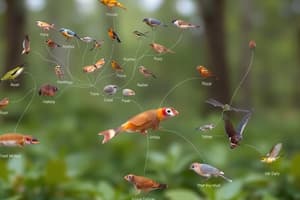Podcast
Questions and Answers
What does a trophic level refer to in community ecology?
What does a trophic level refer to in community ecology?
- A group of species with similar roles in a community
- Steps in the food chain
- A collection of species that use similar resources
- A subset of species that acquire energy in a similar way (correct)
Which term describes a collection of species that use similar resources or have similar roles in a community?
Which term describes a collection of species that use similar resources or have similar roles in a community?
- Community
- Ecosystem
- Guild (correct)
- Trophic level
What characterizes the individualistic view of community ecology?
What characterizes the individualistic view of community ecology?
- All species share similar requirements (correct)
- Species are tightly bound together
- Factors that influence biodiversity are investigated
- Community structure is investigated
What type of interspecific interaction involves different species having different effects on each other, which can be positive, negative, or neutral?
What type of interspecific interaction involves different species having different effects on each other, which can be positive, negative, or neutral?
What principle states that two species competing for the same limiting resources cannot coexist in the same ecological niche for an extended period of time?
What principle states that two species competing for the same limiting resources cannot coexist in the same ecological niche for an extended period of time?
Flashcards are hidden until you start studying
Study Notes
Community Ecology
- A trophic level refers to a level of feeding positions in a food chain, with organisms grouped based on their feeding relationships.
Ecological Communities
- A guild describes a collection of species that use similar resources or have similar roles in a community.
Individualistic View
- The individualistic view of community ecology characterizes communities as a group of species that coexist in a given area, with each species responding individually to its environment.
Interspecific Interactions
- A type of interspecific interaction involves different species having different effects on each other, which can be positive, negative, or neutral.
Competitive Exclusion
- The competitive exclusion principle states that two species competing for the same limiting resources cannot coexist in the same ecological niche for an extended period of time.
Studying That Suits You
Use AI to generate personalized quizzes and flashcards to suit your learning preferences.




